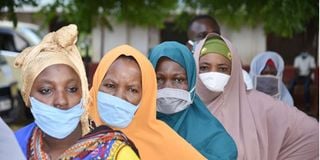By-elections: A juxtaposition of gender proposition in the BBI

Voters queue at Mwaroni Primary School in Msambweni, Kwale County, during the by-election on December 15, 2020.
What you need to know:
- Data from IEBC shows that in 2017, only 96 women were elected to the 47 county assemblies against 1,334 men.
- Additionally, 267 men made it to the national Assembly compared to 23 women.
- Only three out of the nine women who contested for gubernatorial positions were elected.
In the year that just ended, only one woman scooped a seat in the seven by-elections held across the country. And as the Building Bridges Initiatives report proposes that women battle it out for parliamentarian seats, the dismal performance by women in the by-elections is but a reflection of how tough it is for women to get elected.
With the most recent mini-polls held in Msambweni on December 15, 2020 to elect their Member of Parlliament, residents of Dabaso, Wundanyi/Mbale, Kisumu North, Lakeview, Kahawa-Wendani and Gaturi also came out in their numbers to elect their Member of County Assembly. But it is only in Gaturi, Murang'a County that former NTV correspondent, Ms Esther Mwihaki, won the MCA seat under People’s Empowerment Party.
Dismal performance
Beatrice Mwabili who until her death in March last year served as Wundanyi/Mbale MCA in Taita Taveta County, was the only elected female leader in the county assembly. Mr Stephen Mwaluga of Wiper Party won in the by-election.
Election of women is a tussle.For instance,in Lakeview Ward by-election in Nakuru County, there were three women out of 14 candidates. The closest to winning was at position eight with 80 votes out of the 3,702 valid votes cast.The other two came 10th and 11th positions with 35 votes each.
In the 2017 General Election, only 96 women were elected to the 47 county assemblies against 1,334 men, provides data from the Independent Electoral and Boundaries Commission (IEBC). Nine hundred women had vied.
While 267 men made it to the National Assembly compared to 23 women although a total of 131 contested for the Parliamentary seats.
Out of the nine women who sought to be governors, three were successful, the late Dr Joyce Laboso, Anne Waiguru (Kirinyaga) and Charity Ngilu (Kitui).
Of the 47 counties, only seven women became deputy governors including Yulita Mitei (Nandi), Fatuma Achani (Kwale), Adelina Mwau (Makueni), Cecilia Mbuthia (Nyandarua), Evalyn Chepkirui (Narok), Susan Kikwai (Kericho) and Delina Mlagui (Taita Taveta).
Twenty women had eyed Senate chambers but only three made it, namely Susan Kihika(Nakuru), Margaret Kamar (Uasin Gishu) and Fatuma Dullo (Isiolo).
When outgoing Chief Justice David Maraga recommended dissolution of Parliament through an advisory to President Uhuru Kenyatta, leaders including MPs who are supporting the BBI argued that there was no guarantee that at least two-thirds of women could indeed be elected to Parliament.
Universal suffrage
Nyeri Town MP Ngunjiri Wambugu is quoted in a local daily September 22 article saying: "However the reality is that until there is a structure of how to ensure that a universal suffrage election results in a situation where 30 per cent of all elected leaders are of an alternate gender, it will be hard to achieve." He also added that: "Even if Parliament was dissolved and elections called, the results will be as they are today - or worse."
Nevertheless, BBI team proposed an amendment to Article 97 of the Constitution to have 360 MPs elected from the 290 constituencies; constituting single and multiple member constituencies.
There will be no more County Woman Member to the National Assembly. And the amendment neither provides an affirmative action to ensure women compete fairly nor does it create a quota of elective seats for the women in Parliament.
If Kenyans approve of the constitutional amendments in a refenderum assumed to take place this year, then women will have to move mountains to win the majority votes of men and fellow women.





